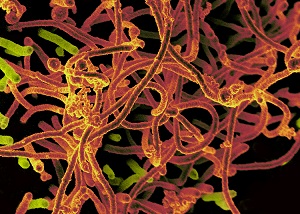You are here
NIH Study Finds No Evidence of Accelerated Ebola Virus Evolution in West Africa
Primary tabs
Tue, 2015-06-09 18:56 — mike kraft

NIH Institute of Allergy and Infectious Diseases (NIAID) June 9, 2015
According to a recent report from the National Institutes of Health (NIH), the current strain of the Ebola virus that is circulating through West Africa is called the Makona strain and is less aggressive than the original Mayinga strain that, which was isolated in Central Africa in 1976.

When compared to the Mayinga strain, the Makona strain takes approximately two additional days to start terminal disease in an animal subject. This is an important discovery to scientists, as they wonder whether the Ebola strain in West Africa will grow more severe over time.
The test subjects were cynomolgus macaques. Researchers used these animals to model disease and infection in humans. The scientists infected three macaques with the Mayinga strain from 1976 and an additional three with the Makona strain from 2015.
Ebola virus, isolated in November 2014 from patient blood samples obtained in Mali. The virus was isolated on Vero cells in a BSL-4 suite at Rocky Mountain Laboratories.
Credit: NIAID RML
Credit: NIAID RML
Read complete story.
http://www.niaid.nih.gov/news/newsreleases/2015/Pages/EbolaMutationRate.aspx
Credit: NIAID RML
Problem, Solution, SitRep, or ?:
Groups this Group Post belongs to:



Comments
Last Year's Ebola Strain Weaker Than That of 1976: Study
AFP June 9, 2015
Washington: The Ebola strain that ravaged West Africa last year is less virulent than the first one that appeared in 1976, researchers reported today.
The results of the test on monkeys by scientists at the National Institutes of Health are considered important because they suggest the virus that caused at least 11,000 deaths is not becoming more severe.
"In fact, the new study suggests the current virus has a decreased ability to cause disease in their animal model compared to the 1976 strain," the study said.
That one is known as the Mayinga strain, while the one that hit Liberia, Guinea and Sierra Leone last year is called the Makona strain.
Read complete story.
http://www.ndtv.com/world-news/last-years-ebola-strain-weaker-than-that-of-1976-study-770232
Mutation Rate, Genotype Variation - Ebola - Mali Case Sequences
sciencemag.org - Published Online March 26 2015
Science 3 April 2015: Vol. 348 no. 6230 pp. 117-119
DOI: 10.1126/science.aaa5646
CLICK HERE - STUDY - Mutation rate and genotype variation of Ebola virus from Mali case sequences
Abstract
The occurrence of Ebola virus (EBOV) in West Africa during 2013–2015 is unprecedented. Early reports suggested that in this outbreak EBOV is mutating twice as fast as previously observed, which indicates the potential for changes in transmissibility and virulence and could render current molecular diagnostics and countermeasures ineffective. We have determined additional full-length sequences from two clusters of imported EBOV infections into Mali, and we show that the nucleotide substitution rate (1.3 × 10–3 substitutions per site per year) is consistent with rates observed in Central African outbreaks. In addition, overall variation among all genotypes observed remains low. Thus, our data indicate that EBOV is not undergoing rapid evolution in humans during the current outbreak. This finding has important implications for outbreak response and public health decisions and should alleviate several previously raised concerns.